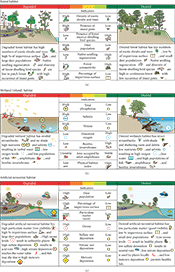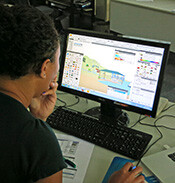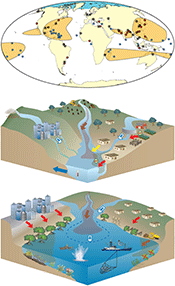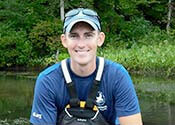Job vacancy: Coastal Communities Planner
The successful candidate will work on programs related to coastal planning in the context of coastal hazards and climate change to: (1) support efforts to incorporate coastal hazards, sea level rise adaptation, and coastal resource values into local planning and management efforts; (2) develop program objectives and review, evaluate, and manage projects; and (3) work to translate science, policy, and planning information to coastal decision-makers, including facilitated training events. The position requires a strong background in the environmental sciences, particularly as it relates to coastal hazards and climate change adaptation.A Habitat-Based Framework for Communicating Natural Resource Condition
 This new article in ISRN Ecology discusses how progress in achieving desired environmental outcomes needs to be rigorously measured and reported. Two major challenges in achieving this are how to synthesize monitoring data in a meaningful way at appropriate temporal and spatial scales, and how to present results in a framework that allows for effective communication to a variety of audiences. This paper presents a habitat framework, developed to assess the natural resource condition of Rock Creek Park (Washington DC), providing insight on how to improve future assessments. Vegetation and stream GIS layers were used to classify three dominant habitat types: Forest, Wetland, and Artificial-terrestrial. This approach has potential to provide assessment of resource condition for diverse ecosystems and provides a basis for addressing management questions across multiple spatial scales.
This new article in ISRN Ecology discusses how progress in achieving desired environmental outcomes needs to be rigorously measured and reported. Two major challenges in achieving this are how to synthesize monitoring data in a meaningful way at appropriate temporal and spatial scales, and how to present results in a framework that allows for effective communication to a variety of audiences. This paper presents a habitat framework, developed to assess the natural resource condition of Rock Creek Park (Washington DC), providing insight on how to improve future assessments. Vegetation and stream GIS layers were used to classify three dominant habitat types: Forest, Wetland, and Artificial-terrestrial. This approach has potential to provide assessment of resource condition for diverse ecosystems and provides a basis for addressing management questions across multiple spatial scales.
Science communication courses in Cambridge and Samoa
 During May, IAN held science communication courses with participants from a wide variety of organizations, countries, and cultures. The course on the Horn Point campus in Cambridge, MD had students from Maryland Department of Natural Resources, US Environmental Protection Agency, Smithsonian Environmental Research Center, Conservation International, Sinclair Knight Merz (Australia), and graduate students and professors from a variety of local and regional universities. In Samoa, we taught courses for the Secretariat of the Pacific Regional Environment Programme and the Ministry of Natural Resources and Environment. Students in these courses were from Samoa, Fiji, Australia, New Zealand, and Great Britain.
During May, IAN held science communication courses with participants from a wide variety of organizations, countries, and cultures. The course on the Horn Point campus in Cambridge, MD had students from Maryland Department of Natural Resources, US Environmental Protection Agency, Smithsonian Environmental Research Center, Conservation International, Sinclair Knight Merz (Australia), and graduate students and professors from a variety of local and regional universities. In Samoa, we taught courses for the Secretariat of the Pacific Regional Environment Programme and the Ministry of Natural Resources and Environment. Students in these courses were from Samoa, Fiji, Australia, New Zealand, and Great Britain.
The coastal syndromes and hotspots on the coast
 This paper by members of the Land-Ocean Interactions in the Coastal Zone (LOICZ) group, including IAN alumnus, Tim Carruthers, discusses how human intervention has resulted in a number of global and river syndromes that are mirrored by coastal syndromes. These problems are now global, with few coastal zones remaining unaffected and pristine. However, the problems are particularly severe at "hotspots" in the coastal zone. These include river-mouth systems where fluxes of water, sediment, fertilizers and contaminants are focused; urbanized coasts and megacities where vulnerable populations are concentrated; Arctic coasts where the effects of climate change are accelerating a fundamental state change; and, at low lying coasts that are at risk of flooding, storm surges, sea-level rise and subsidence such as Micronesian island states where managed realignment and setback is not an option. A range of societal responses and appropriate governance frameworks will be necessary to treat the coastal syndromes.
This paper by members of the Land-Ocean Interactions in the Coastal Zone (LOICZ) group, including IAN alumnus, Tim Carruthers, discusses how human intervention has resulted in a number of global and river syndromes that are mirrored by coastal syndromes. These problems are now global, with few coastal zones remaining unaffected and pristine. However, the problems are particularly severe at "hotspots" in the coastal zone. These include river-mouth systems where fluxes of water, sediment, fertilizers and contaminants are focused; urbanized coasts and megacities where vulnerable populations are concentrated; Arctic coasts where the effects of climate change are accelerating a fundamental state change; and, at low lying coasts that are at risk of flooding, storm surges, sea-level rise and subsidence such as Micronesian island states where managed realignment and setback is not an option. A range of societal responses and appropriate governance frameworks will be necessary to treat the coastal syndromes.
Farewell to Jeff Allenby
 Jeff has been working with IAN through a partnership with the Maryland Department of Natural Resources to help local communities to realize and proactively adapt to climate change and coastal hazards. Jeff will be going to the Chesapeake Conservancy in Eastport to be their Conservation Planner. He will be working on incorporating climate adaptation into conservation targeting and exploring new ways to use technology to access data and increase public outreach and communications. We wish Jeff all the best with his future endeavors.
Jeff has been working with IAN through a partnership with the Maryland Department of Natural Resources to help local communities to realize and proactively adapt to climate change and coastal hazards. Jeff will be going to the Chesapeake Conservancy in Eastport to be their Conservation Planner. He will be working on incorporating climate adaptation into conservation targeting and exploring new ways to use technology to access data and increase public outreach and communications. We wish Jeff all the best with his future endeavors.

